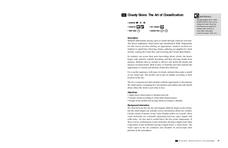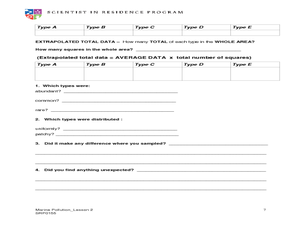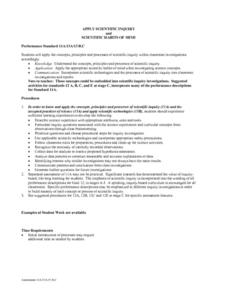Curated OER
Science Observations
First graders investigate change by analyzing a photograph. In this scientific observation lesson plan, 1st graders view a photograph of a baby and attempt to memorize the details. Student view the photo a few minutes later, trying to...
Curated OER
Observation vs. Inference
Student observe two cups, one slightly smaller and skinnier than the other, with one put inside the other. The cups are turned upside-down and the smaller one is caught as it falls out of the larger cup. The larger cup is filled up about...
Curated OER
Cut Ice Cubes in Half Like Magic
Learners explore the process of melting or cutting ice. In this scientific observation lesson, students discover that the pressure from two weights will pull a string through an ice cube by melting the ice directly under the line of...
Bekshire Museum
Cloudy Skies: The Art of Classification
Such a great resource and perfect for learners in Kindergarten through third grade. The class will discuss cloud types and formation, and then they'll get outside and draw as they observe the clouds they see. They'll need to take note of...
Curated OER
Indirect Observation
Students observe obscertainers through indirect observations and make hypotheses about the internal wall structures of the containers. In this indirect observation lesson plan, students make observations of 4 obscertainers with a steel...
Curated OER
Scientific Method Activity
In this scientific method instructional activity set, students listen to a song that tells the order of the steps of the scientific method. They write the steps on the blank lines. They complete a second instructional activity in which...
Curated OER
Scientific Sampling
Students take a sample of fish and try to determine how many fish are in the sea. In this scientific sampling lesson, students explore the way scientists measure large areas of samples. Students record the distribution in a quadrant.
Curated OER
Oyster Shell Observation
Fourth graders, practicing scientific method, identify specific attributes to various oyster shells.
American Chemical Society
Colors Collide or Combine?
As part of a unit investigating the dissolving of M&Ms® candy coating, this lesson examines whether or not the different colors combine. There are no new concepts revealed in this particular lesson, but learners will see that the...
Towson University
Mystery Tubes
How do scientists know they're right? Truth be told, they don't always know. Explore the scientific process using mystery tubes in an insightful activity. Young scientists discover how to approach and solve problems in science, how ideas...
Serendip
Carbohydrate Consumption, Athletic Performance and Health – Using Science Process Skills to Understand the Evidence
Should athletes carb load before an event or consume carbohydrates during the competition? Scholars discuss how to set up a hypothesis and experiment to answer a question relating carbohydrates and athletic performance. Then, they read...
Howard Hughes Medical Institute
Sorting Seashells
Scientists use morphological, physiological, and molecular information to continually revise organism classification. Scholars observe and learn about 20 shells. Then, they work to sort and classify the shells, building a taxonomy based...
Towson University
Looking Backwards, Looking Forward
How do scientists know what Earth's climate was like millions of years ago? Young environmental scholars discover how researchers used proxy data to determine the conditions present before written record. Grouped pupils gain experience...
Curated OER
Journal Introductions
Students explore the idea of scientific observation and the use of a journal to record their observations. They examine the proper vocabulary used when describing scientific inquiry. Students observe a science experiment and they discuss...
Curated OER
Scientific Method
In this Scientific Method worksheet, students demonstrate understanding of the Scientific Method by completing a chart. Students label the important steps taken while using this method in conducting an experiment.
Curated OER
Observations and Inferences
Students observe how to distinguish observations form inferences. In this examining inferences lesson students list observations relating to the activity and discuss the importance of them.
Curated OER
Apply Scienctific Inquiry and Scientific Habits Of Mind
Students describe science experience with appropriate attributes, units, and tools. They formulate inquiry question associated with the science experiences and curricular concepts from observations through class brainstorming. Pupils...
Curated OER
Introduction to Scientific Theory
Ninth graders explain how scientists set up investigations. For this scientific process lesson, 9th graders review the principles of the scientific method and use these skills to answer an open-ended question about how to set up a...
Curated OER
Scientific Method
For this scientific method worksheet, students read and discuss a 2 page article on the scientific method, match 3 founders of the scientific method with what they found or produced, answer 4 statements as true or false, list 3 crucial...
Curated OER
Scientific Thinking
Students participate in four different activities which reinforce an understanding of they way scientists think about the world. They make careful observations of two different pennies, write the procedure for making a peanut butter and...
Curated OER
Using The Scientific Method
Pupils are given a problem or hypothesis, they can create a relevant experiment using the steps to the scientific method. They collect quantitative and qualitative observations in scientific experiments. Students identify the difference...
Curated OER
Rusting and the Scientific Method
Pupils observe the oil can scene with the tin man from a clip from "The Wizard of Oz" and answer the question, "What can we learn about rust from this scene?". They take 2 tubes and 2 nails, adding 1 salt packet to 2 ml of distilled...
Curated OER
A Biology Game To Promote Classification And Observation
Students play a biology game. In this science lesson plan, students play a game that require them to use observation skills and develop their classification skills.
Curated OER
Apply Scientific Inquiry and Scientific Habits of Mind
Students review the components of the scientific inquiry method. In groups, they apply this method to various experiments they are given to complete. They also use the correct scientific habits of mind when researching different concepts.

























